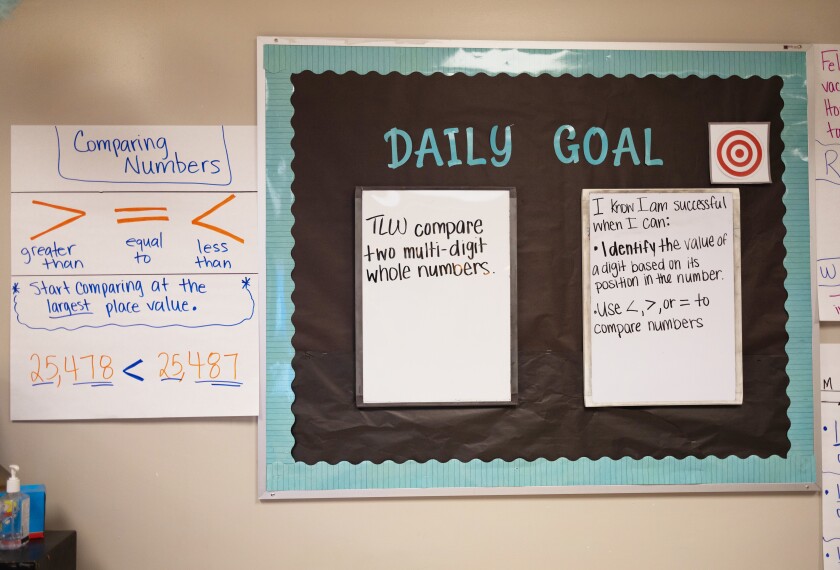How should we teach children math?
Given that over 50 percent of Americans report that they fear and hate math and a large proportion say they experience math anxiety, this is not a trivial question. Math is the language of the 21st century, and who learns and uses math has major implications for who will have access to good jobs and other opportunities.
In many parts of the country, nonetheless, educators and policymakers are embroiled in debates over how to teach math. In Florida, the state’s governor has decided to make war against what he calls “woke math.” In California, the debate over the proposed mathematics framework is at the center of an all-out math war. While much of the public is oblivious to the conflagration there, it appears likely that millions of California’s children will lose out in the conflict.
The high-level outlines of the math curriculum wars have hardly changed over the years. On the one hand are proponents who advocate a “traditional” approach to take us “back to basics.” This approach emphasizes mostly procedural fluency in working math problems, traditional sequencing of courses, and teacher-directed instructional approaches. On the other side are the advocates who call for a more “reform-oriented” version of math. They argue that what is needed is greater relevance and application of mathematics to students’ lives, more mathematical thinking and problem solving, and a focus on more “modern” content like statistics and data science.
Although neither of us are math educators, we have followed the policy debates closely and are familiar with the issues involved. Both sides make valid points—but the combatants miss the larger point: While they fight over their broad visions for math instruction, educators are left with the impossible task of figuring out on their own what to do in the classroom right now as schools reopen. As is too often the case, kids are the most likely to lose out.
Presently, millions of students across the nation are far behind where they need to be in mathematics, and the pandemic has only made this worse. In California, even before the pandemic, just 40 percent of students were meeting state standards in mathematics. Even fewer, just 29 percent, were meeting national standards for proficiency on the National Assessment of Educational Progress. Recent reports make clear that student performance declined substantially during the pandemic—as much as a 10-percentage-point decrease in the percent of children scoring at grade level in mathematics.
There are several reasons to be especially concerned about mathematics. First, while recent evidence suggests some of the reading losses during the pandemic have started to be addressed, math declines actually got worse in the 2021-22 school year. Second, by all accounts these declines are larger in schools serving more disadvantaged kids—students of color and students from low-income families. And third, these declines are considerably larger in schools that were closed for longer.
The good news is that schools have substantial supplemental funding from federal and state governments to address these glaring needs. The bad news is that schools are receiving little guidance on how to use those funds to address the needs of their students.
State and national leaders must step in and provide the guidance educators desperately need.
Here are a few ways leaders in state departments of education and the U.S. Department of Education could help, particularly with respect to math:
- Good tools exist to identify what kids know and which critical gaps in their knowledge must be shored up. State leaders should help districts spend their COVID-recovery dollars on assessments that are embedded in curriculum and provide accurate, actionable information to teachers about areas of student need. Schools should be advised to make data-informed decisions and meet kids where they are academically, even if that isn’t grade-level standards. Forcing kids to tackle advanced skills before they have mastered the building blocks will result in most kids falling further behind.
- After-school programs can be used to ensure that students have the time needed to acquire the skills necessary to learn advanced math. Given that few colleges are expanding remedial courses, it is essential that high schools enact measures to ensure kids are prepared for college. Greater communication and coordination between K-12 and higher education systems will also be needed.
- Individualized tutoring could be a great solution, but there aren’t enough highly skilled tutors available. High-quality software programs such as Knowledgehook and online tutoring programs such as Zearn and Khan Academy can be used to help students and teachers; state departments should advise districts on the best programs and sources of support for these purposes.
- Leaders should champion schools that provide curriculum-focused professional learning and offer time for teacher collaboration and for targeted intervention and support to address math deficiencies.
These math wars follow similar fights over how to teach reading. In those wars, specialists dug in, supporting either a phonics or whole-language approach. Despite the prolonged disputes, policymakers made progress by choosing a middle path. A similar outcome here would make the most sense for most students.
We cannot afford the math wars, the reading wars, or any of the other tiresome debates that produce paralysis and stymie meaningful action.
Leaders must find ways to make math relevant and interesting and they must ensure that their students are being prepared for advanced courses like algebra, geometry and calculus.
The truth is, we cannot afford the math wars, the reading wars, or any of the other tiresome debates that produce paralysis and stymie meaningful action. Education should be a nonpartisan issue, but increasingly, it’s not. Instead of fighting over how to teach math, we should be focused on how to support teachers and students in gaining math proficiency.
Again, access to learning math is a critical equity issue for our nation’s future. Leadership at the state and national levels is needed now to stop the fighting and begin moving our schools in a more constructive direction.




